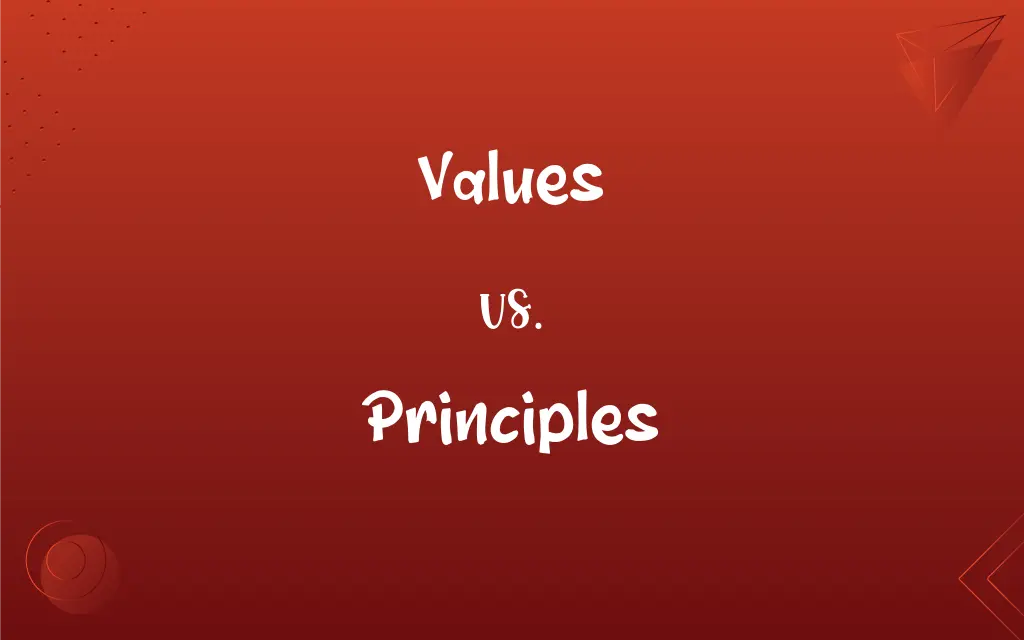Values vs. Principles: What's the Difference?
Edited by Aimie Carlson || By Harlon Moss || Updated on October 7, 2023
Values are core beliefs driving behavior, while principles are accepted rules governing conduct or procedures, often derived from values.

Key Differences
Values, serving as the cornerstone of our actions, intrinsically motivate our behavior and choices in life. In essence, values emerge from personal, cultural, or societal beliefs and serve as foundational elements shaping our perspectives and reactions to various circumstances. On the flip side, principles stand as universal or widely accepted truths or doctrines that guide our actions, often ensuring consistency and ethical adherence in our behaviors.
Emphasizing the inherent personal connection, values are deeply ingrained and frequently influence our emotional responses to situations. They often hold a significant personal aspect, being something individuals hold dear and precious. Conversely, principles extend across a broader spectrum, often being shared among a group, society, or culture, presenting a unified guideline or code that informs appropriate and ethical actions, regardless of personal beliefs or feelings.
Values invariably carry a subjective tone, being moulded by personal experiences, cultural background, and individual worldview. The subjectivity in values means that they can differ vastly between individuals even within the same cultural or organizational context. Meanwhile, principles, by contrast, align more with objectivity, frequently transcending personal biases or emotional inclinations to establish a foundation upon which fair and ethical decisions can be made.
Further exploring their functionality, values frequently act as the inner compass that navigates through the multitude of life’s choices and paths, embodying what is deemed ‘important’ by an individual or group. However, principles perform as the common path that people agree to follow, providing a shared guide that facilitates mutual understanding and cooperation by ensuring that actions and practices adhere to a recognized ethical and procedural standard.
Interestingly, while values and principles both shape behavior, they do so from different fronts and through different mechanisms. Values infiltrate our actions, choices, and responses from an intrinsic, emotional, and personal domain, quietly shaping our preferences and affections. On the other hand, principles, while potentially springing from values, stand as steadfast, often explicitly stated, guidelines that direct behavior and decision-making on a more universal level, providing a stable framework that navigates moral and ethical dilemmas.
ADVERTISEMENT
Comparison Chart
Nature
Inherent, personal beliefs
Universal or widely accepted guidelines
Influence on Behavior
Motivates and informs personal choices
Guides ethical and consistent behavior
Subjectivity/Objectivity
Subjective and can vary greatly between people
Tend to be objective and commonly accepted
Source
Derived from personal/cultural beliefs
Formulated based on ethical or moral norms
Application
Applied on a personal level
Applied on a societal or organizational level
ADVERTISEMENT
Values and Principles Definitions
Values
Values signify deeply held beliefs that drive personal behavior.
Her values of honesty and integrity always shine through in her dealings with clients.
Principles
Principles act as a foundation, ensuring consistency in thought and action.
The principles of justice guide legal systems in ensuring fair treatment and judgment.
Values
Values can reflect cultural, societal, or personal norms that dictate preferences.
Respect for elders is one of the values deeply embedded in many cultures.
Principles
Principles are established guidelines or rules that navigate ethical behavior.
The company operates under principles of customer satisfaction and ethical dealings.
Values
Values are intrinsic and can shape emotional responses and affinities.
His values always lead him to support underprivileged communities.
Principles
Principles serve as fundamental truths or doctrines accepted by a group.
The scientific principles of thermodynamics govern heat transfer and energy transformation.
Values
Values often govern what individuals perceive as important or worthwhile.
Environmental values influence people to adopt sustainable practices.
Principles
Principles often stand as moral or ethical codes guiding conduct.
The doctor follows medical principles to ensure safe and ethical practice.
Values
Values can provide a personal compass, guiding decision-making and preferences.
His values of diligence and perseverance were evident in his rigorous study habits.
Principles
Principles can transcend personal beliefs to establish common behavioral guides.
Democratic principles guide governments towards equal representation and citizen participation.
Values
An amount, as of goods, services, or money, considered to be a fair and suitable equivalent for something else; a fair price or return.
Principles
A basic truth, law, or assumption
The principles of democracy.
Values
Monetary or material worth
The fluctuating value of gold and silver.
Principles
A rule or standard, especially of good behavior
A man of principle.
Values
Worth in usefulness or importance to the possessor; utility or merit
The value of an education.
FAQs
How do values impact decision-making?
Values influence decision-making by aligning choices with what is perceived as important or worthwhile to an individual or group.
How do principles differ from values?
Principles are widely accepted rules or guidelines, often derived from values, which guide conduct or procedure.
Can values change over time?
Yes, values can evolve based on personal experiences, societal shifts, and cultural exposure.
Can values and principles overlap or be interconnected?
Yes, values and principles can be interconnected, with values often informing the development of principles.
How can values be identified or recognized?
Values can be recognized through reflection on personal preferences, emotional responses, and consistent choices or behaviors.
What are values?
Values are deeply held beliefs that guide our choices and behavior.
Are principles universally accepted?
Generally, principles are broadly accepted within a particular group, society, or industry but might not be universal across all cultures or contexts.
Do principles dictate moral and ethical behavior?
Yes, principles often serve as ethical guidelines, ensuring that behavior adheres to accepted standards of right and wrong.
Can principles conflict with personal values?
Yes, principles might sometimes conflict with personal values, especially if they are derived from different cultural or ethical frameworks.
Are values subjective or objective?
Values are subjective as they are deeply personal and can vary significantly between individuals.
Can values and principles influence social change?
Yes, values and principles often play a pivotal role in driving social change by influencing societal norms and ethical standards.
How are values developed?
Values can be developed through cultural influences, personal experiences, upbringing, and internal reflections.
What role do principles play in professional settings?
Principles establish a shared framework that guides ethical and consistent behavior and decisions in a professional environment.
Do principles shape legal systems and frameworks?
Yes, legal systems often rely on foundational principles that guide laws, regulations, and judgments.
Why are principles essential in governance and leadership?
Principles provide a stable, ethical foundation that guides decision-making and behavior in governance and leadership.
Why are values important in personal development?
Values help individuals understand what is meaningful to them, guiding personal growth and interpersonal interactions.
Can an organization have a set of defined values?
Yes, organizations often have a set of defined values that guide their culture, decision-making, and business practices.
How are principles applied in scientific research?
In scientific research, principles serve as established truths or laws that guide hypotheses, experimentation, and conclusions.
Can principles enforce ethical business practices?
Yes, principles can establish guidelines that ensure businesses operate ethically and responsibly.
How do societal values impact cultural practices?
Societal values shape cultural practices by influencing norms, traditions, and societal expectations.
About Author
Written by
Harlon MossHarlon is a seasoned quality moderator and accomplished content writer for Difference Wiki. An alumnus of the prestigious University of California, he earned his degree in Computer Science. Leveraging his academic background, Harlon brings a meticulous and informed perspective to his work, ensuring content accuracy and excellence.
Edited by
Aimie CarlsonAimie Carlson, holding a master's degree in English literature, is a fervent English language enthusiast. She lends her writing talents to Difference Wiki, a prominent website that specializes in comparisons, offering readers insightful analyses that both captivate and inform.































































